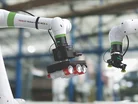Cobots: Harnessing AI & Addressing Labour Shortages

Automation and robotics are reshaping key industries in the global business landscape.
Nowhere is this more prominent than in manufacturing, where collaborative robots, or cobots are being more widely adopted.
As manufacturers face growing labour shortages and increasing costs, the demand for greater flexibility and reduced downtime becomes crucial. Cobot technology is not only redefining the workplace but also allowing businesses to focus on more complex and innovative tasks, thereby enhancing their transformation strategies.
In this context, AI is driving a broader industrial shift towards an optimised workplace, equipping organisations with the tools they need to upscale their operations.
Cobots: growing in popularity
A cobot, or companion robot, is designed for direct human-robot interaction within a shared space, or where humans and robots work in close proximity.
These machines are typically lightweight and built to ensure maximum safety in the workplace.
The market for cobots is rapidly expanding, having been valued at approximately US$760m in 2022, according to Apollo Research Reports.
This figure is projected to surge to US$22.6bn by 2032.
These machines operate using a range of sophisticated hardware and software, including robotic arms that are equipped with multiple joints to facilitate a wide range of motion.
Programming cobots can be done via traditional coding, graphical user interfaces, or even hand-guiding the robot through desired movements.
- Compact design allows them to be easily integrated into existing workspaces without major reconfigurations
- The ability to be repurposed for different tasks, which makes them ideal for small-batch production or frequently-changing product lines
- Advanced sensors and software that allows them to detect unexpected contact and immediately halt operations to prevent accidents
As a result, cobots can assist throughout various areas of business. Perhaps the most well-known use case for them currently is in manufacturing and industrial environments performing tasks such as welding, handling heavy loads and quality testing and inspection.
On a more complex level, cobots are being integrated with machine learning algorithms to improve their adaptability within a specific environment and so they can improve their decision-making abilities.
Despite their growing popularity within warehouse and manufacturing environments, there are still several key challenges associated with cobots.
Concerns remain over these machines replacing human labour, which could contribute to increased job cuts.
Likewise, it is important to set cobots up responsibly to avoid increased safety risks.
Cobots on average have a lifespan of roughly 30,000 to 40,000 hours.
AI driving Cobot innovation
AI is now playing a critical role in cobot manufacturing operations, helping robots perform more complex tasks.
In line with the continued fast-paced development of generative AI (Gen AI), robotic exploration has turned increasingly into action in 2024.
Now, the industry is poised to rapidly accelerate, with advances in deep learning algorithms for example improving robot interactions and helping business leaders with their decision-making capabilities.
Companies developing robotics with AI in mind include FANUC and Universal Robots, who have expanded their models to fit a broad range of applications.
This had led them to become one of the most popular cobot series in the world.
“It has been interesting and perhaps surprising to see AI changing the lives of office workers before it touches working practices in most factories,” Anders Billesø Beck, Vice President of Strategy and Innovation at Universal Robots says.
“We have many partners developing applications using AI to allow our robots to perform more complex and diverse functions. For example, AI allows robots to have human-like perception, handle variation, move parts precisely, adapt to changing environments, and learn from their own experience.”
As cobot technology continues to be developed, they are expected to become more common across numerous workplaces. If used successfully, they have the potential to improve worker safety and adapt to changing production needs.
******
Make sure you check out the latest edition of Manufacturing Digital and also sign up to our global conference series - Procurement & Supply Chain 2024 & Sustainability LIVE 2024
******
Manufacturing Digital is a BizClik brand.
- The University Manufacturing Circuit Boards from LeavesSustainability & ESG
- Schneider Electric's Commitment to Sustainable ManufacturingSustainability & ESG
- Lenovo & Saudi Alat Building Green Manufacturing FacilitySustainability & ESG
- Nissan Brings Biodiversity to the Factory through RewildingSustainability & ESG


